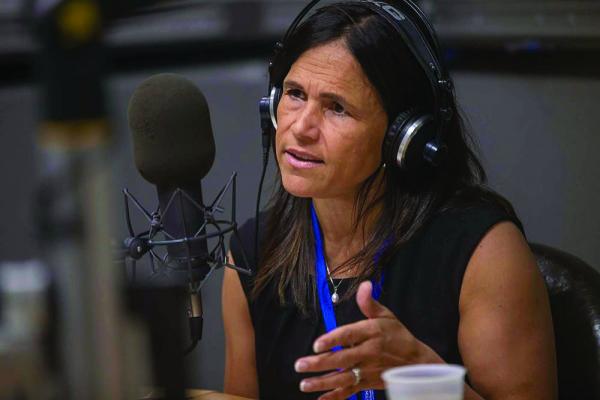October 15, 2020

Superintendent of Schools Brenda Cassellius, above, said she was “extremely pleased” with the plan as developed by a nine-member task force this summer — especially its mechanism for favoring the city’s underserved precincts. Jesse Costa/WBUR photo
Boston Public Schools’ three prestigious exam schools will not use an exam to select their next incoming classes under a recommendation by Superintendent Brenda Cassellius. Under the plan, 20 percent of seats available next year would be allocated to students with the city’s top grades. The remaining 80 percent would be admitted to the schools based on their GPA ranking within their home ZIP code, with eligible students from the lowest-income ZIP codes given first choice.
Cassellius said last Thursday afternoon that she was “extremely pleased” with the plan as developed by a nine-member task force this summer — especially its mechanism for favoring the city’s underserved precincts.
“Oftentimes, when children come to us with less, they get less,” Cassellius said. “In this instance, they’re getting first access. ... That part of it really warmed my heart.”
Student demographics at the three selective schools — the O’Bryant School of Mathematics and Science, Boston Latin Academy, and the Boston Latin School, in particular — don’t mirror the district as a whole.
For instance, 72.4 percent of all Boston Public School students were Black or Latino in the last school year, compared to just 21 percent at the Boston Latin School. Similar gaps — again, especially wide at BLS — appear among the share of students classed as “economically disadvantaged.”
Under the plan to be presented to a remote meeting of the school committee Thursday night, the district would draw up a pool of eligible students who either maintained a B average in school this academic year or who “met or exceeded expectations” on the 2019 MCAS test.
The students’ schools — whether public, charter, or private — would also need to certify that those students are learning at grade level under the state’s curriculum frameworks to be judged eligible.
If implemented, the plan projects a rise of 15 percentage points in the number of seats apportioned to Black and Latino students.
Tanisha Sullivan, president of the Boston branch of the NAACP, sat on the task force that developed the proposal alongside BLS headmaster Rachel Skerritt and her predecessor, Michael Contompasis.
Sullivan said last Thursday that these measures reflect concerns about administering a test during a pandemic that disproportionately disrupted the lives and learning of thousands of students.
The data are “clear about the impact of the Covid-19 pandemic on communities of color and, specifically, low-income communities,” Sullivan said. “The final decision of the group, as a result, was that it was neither fair nor feasible to administer an exam” for the following school year.
The School Committee is tentatively scheduled to vote on the proposal on Oct. 21.
Speaking for himself, school committee chair Michael Loconto described the proposal as an “elegant” adjustment to the difficult circumstances of this year.
Both Loconto and Sullivan confirmed that, if approved, the plan would only apply to student candidates for the 2021-22 academic year, for now. But Loconto said the task force has asked to continue its work into the future in search of a permanent solution that would also foster equity.


